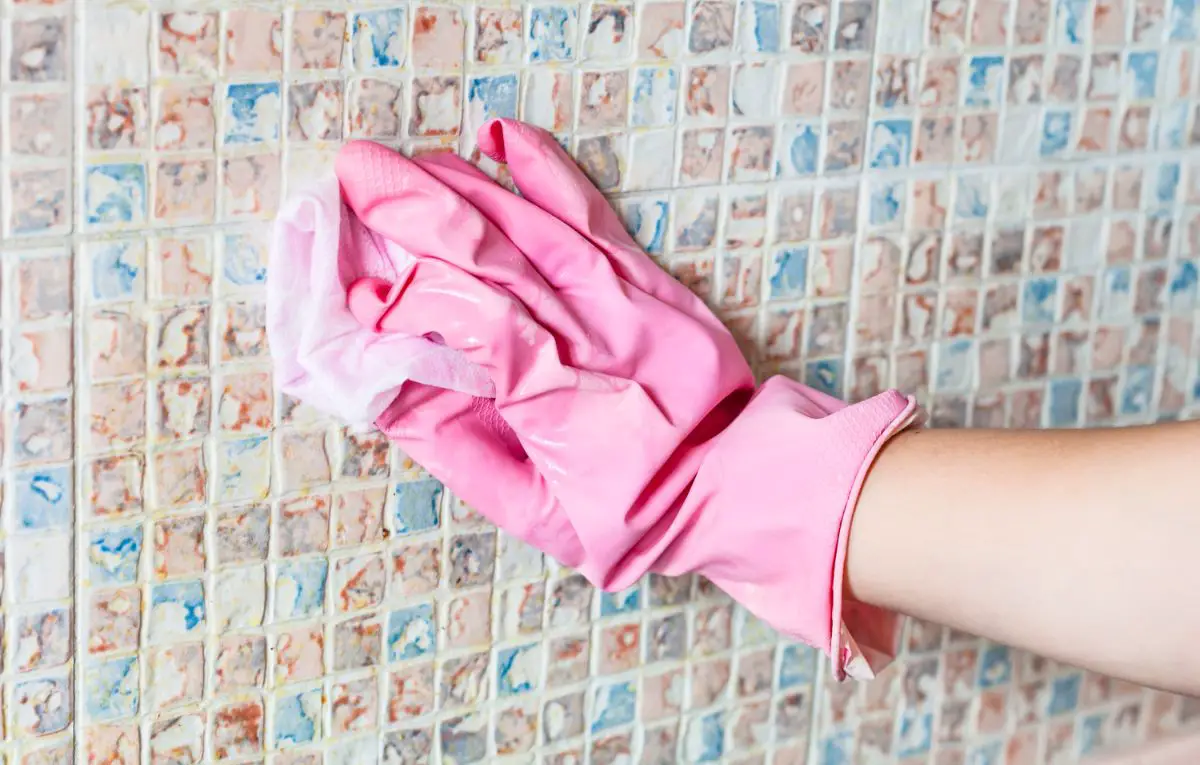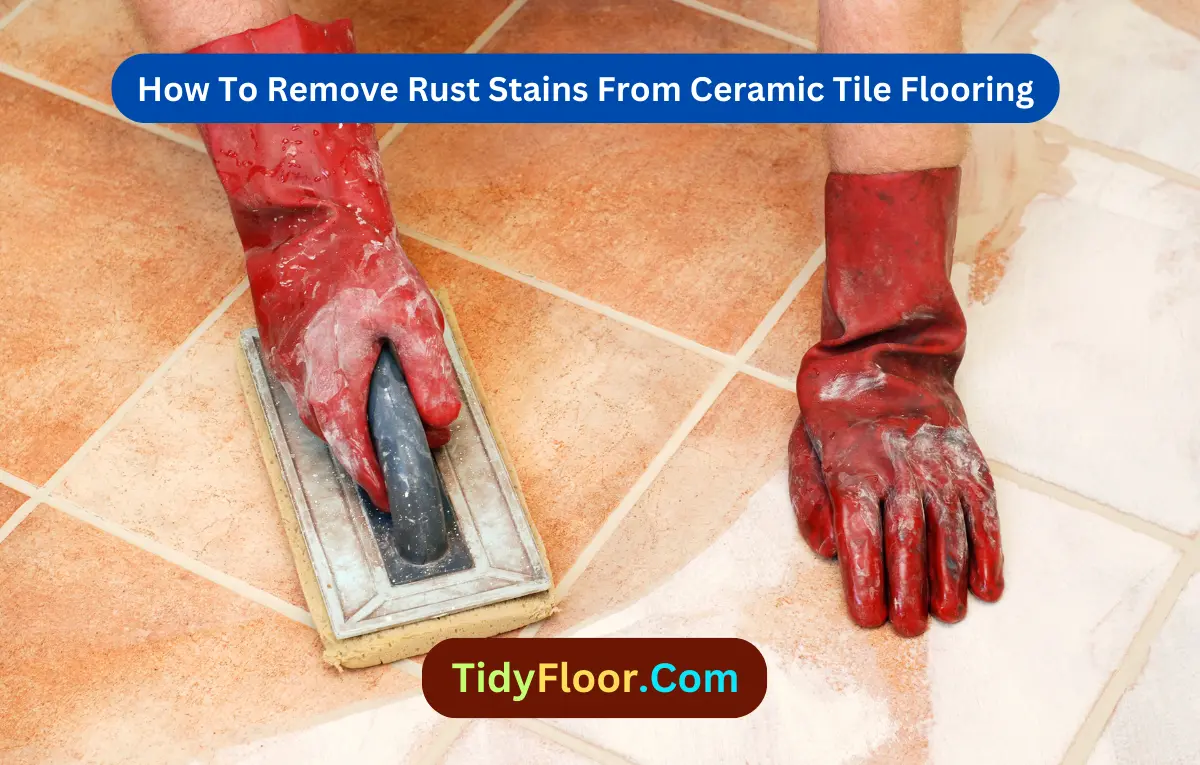How To remove rust stains from ceramic tile flooring, create a paste using equal parts baking soda and water. Apply the paste to the stain, scrub with a soft brush or sponge, and let it sit for 15 minutes.
Eliminate rust stains on ceramic tiles effortlessly with DIY methods: apply baking soda-water paste or a lemon juice-salt alternative, scrub gently, and rinse thoroughly. Prioritize preventive measures like sealing, prompt repairs, and regular cleaning for a lasting, chemical-free pristine floor.
Regular cleaning and rust prevention measures, such as sealing and addressing water leaks promptly, contribute to maintaining the tiles’ pristine appearance. Embrace these steps for effective rust removal without compromising the integrity of your ceramic floor.
6 Steps How To Remove Rust Stains From Ceramic Tile Flooring:
These are 6 step-by-step methods that can remove rust stains from ceramic tile flooring:
Step 1: Create A Paste
Eliminate rust stains from ceramic tile flooring with ease. Form a paste using equal parts baking soda and water, apply it to the stain, and gently scrub before rinsing thoroughly. Stubborn stains? Opt for a mixture of lemon juice and salt. Regular maintenance ensures the tiles maintain their pristine appearance.
Step 2: Apply Paste
Apply a paste of equal parts baking soda and water to remove rust stains from ceramic tile flooring. Spread it over the stain, let it sit for 15 minutes, and gently scrub. Rinse thoroughly. For persistent stains, use a paste of lemon juice and salt, repeating the process if needed.
Step 3: Scrub Gently

When removing rust stains from ceramic tile flooring, ensure effective yet delicate cleaning by scrubbing gently. Use a soft brush or sponge with the applied paste to avoid damaging the tile surface. This method effectively cleanses without compromising the integrity of the flooring.
Step 4: Rinse Thoroughly
After applying the rust-stain-removing paste to ceramic tile flooring, it’s crucial to complete the process by rinsing thoroughly. Use clean water to wash away the paste, ensuring no residue remains. This final step not only safeguards the tile surface but also guarantees a spotless finish, leaving the flooring restored and free from any cleaning product remnants.
Step 5: Alternative Solution
For stubborn rust stains on ceramic tile flooring, consider an alternative solution. Craft a paste using lemon juice and salt, applying it to the persistent stain. Let it sit for 15 minutes, then scrub gently with a soft brush or sponge. Rinse thoroughly. This citrus-infused mixture offers an effective alternative, tackling tough stains while maintaining the integrity of your tile surfaces.
Step 6: Preventive Measures
Implement preventive measures to maintain ceramic tile flooring. Regular cleaning routines, and rust prevention strategies are essential. Avoiding prolonged exposure to moisture, promptly cleaning spills, and using protective coatings contribute to the long-term preservation of the tiles, ensuring a lasting and pristine appearance.
Preparing For Ceramic Rust Removal:
When preparing for ceramic rust remover rust removal, gather necessary supplies such as baking soda, water, lemon juice, and salt. Clear the affected area, ensuring it’s dry. Have soft brushes or sponges ready for scrubbing. Taking these steps beforehand will streamline the process and enhance the effectiveness of the rust removal technique on surfaces like ceramic tile flooring.
Reasons For Rust Stains On Ceramic Tile Flooring:
Rust stains on ceramic tile flooring stem from metal objects, water exposure, leaks, inadequate sealing, and outdoor elements. Identifying these causes facilitates effective prevention and removal strategies for a pristine floor.
Metallic Objects:
Metallic objects on ceramic tile flooring pose a risk of rust stains due to oxidation. When metal items, such as furniture or tools, come into contact with the tiles, the ensuing chemical reaction promotes corrosion, resulting in unsightly rust. Regular checks and protective measures help prevent and mitigate this aesthetic concern.
Water Exposure:
Prolonged water exposure on ceramic tile flooring, particularly with high iron content in hard water, induces rust stains. The interaction between water and metal surfaces triggers oxidation, causing rust formation and detracting from the tiles’ aesthetic appeal.
Leakages:
Water leakages on ceramic tile flooring contribute to rust stains. Leaks from appliances or plumbing expose underlying metal surfaces to moisture, accelerating corrosion. Timely detection and repairs are essential to prevent not only rust but also potential structural damage, preserving the floor’s integrity.
Lack of Sealing:
The lack of proper sealing on ceramic tile flooring allows moisture infiltration, leading to of rust stains. The absence of an effective barrier enables water to reach metal components, initiating oxidation and compromising the tiles’ appearance. Applying adequate sealing prevents such corrosion, preserving the floor’s aesthetics.
Metallic Objects:
Ceramic tile flooring is susceptible to rust stains from outdoor elements like rain and humidity. Exposure to these environmental factors accelerates the rusting process, compromising the tiles’ visual appeal. Regular maintenance and protective measures are vital to safeguard against these weather-induced concerns.
DIY Cleaning Methods:
DIY cleaning methods for ceramic tile flooring involve simple yet effective steps. Create a paste using equal parts baking soda and water for routine cleaning. For stubborn rust stains, concoct a mixture of lemon juice and salt. Apply the paste, let it sit, and scrub gently with a soft brush or sponge. Rinse thoroughly for a refreshed look. Regular preventive measures, like sealing tiles and addressing water leaks promptly, enhance long-term cleanliness. These cost-effective solutions not only remove stains but also contribute to the preservation of the tiles’ pristine appearance. Embracing DIY methods ensures a clean, aesthetically pleasing ceramic tile floor without the need for harsh chemicals.
Related Questions
Will Commercial Rust Stain Cleaning Damage My Tiles?
Commercial rust stain cleaning products are generally safe for tiles if used as directed. However, prolonged use or using abrasive cleaners may harm the tile surface. Always follow product instructions, test in a small, inconspicuous area first, and consider seeking professional advice for stubborn stains to ensure the tiles’ integrity is maintained.
Do I Need To Rinse The Area After Cleaning The Ceramic Tile Floor?
It’s crucial to rinse the area after cleaning a ceramic tile floor. Rinsing removes any residue from cleaning agents, preventing a buildup that could affect the tiles’ appearance.
Ensure thorough rinsing with clean water to leave the floor spotless and maintain its pristine condition.
Can Baking Soda Remove Rust Rom Tiles?
Baking soda can effectively remove rust from tiles. Create a paste using baking soda and water, apply it to the rust stain, let it sit for a few minutes, and scrub gently. Rinse thoroughly.
The mild abrasive properties of baking soda help lift the rust without damaging the tile surface.
Does CLR Remove Rust Stains From Tiles?
CLR (Calcium, Lime, Rust) is effective in removing rust stains from tiles. Follow product instructions, apply the CLR solution to the rust stain, let it sit for the recommended time, and then scrub gently. Rinse thoroughly.
CLR’s rust-dissolving properties make it a suitable choice for tackling stubborn rust stains on various surfaces, including tiles.
Conclusion
In summary, achieving and preserving the integrity of ceramic tile flooring requires a blend of preventive actions and efficient cleaning methods. From promptly fixing water leaks to employing mild cleaning solutions—integral steps in How To Remove Rust Stains From Ceramic Tile Flooring—these practices guarantee a rust-free, visually appealing floor. Consistent care not only eliminates stains but also extends the longevity of the tiles, enhancing the cleanliness and preservation of your living space.


